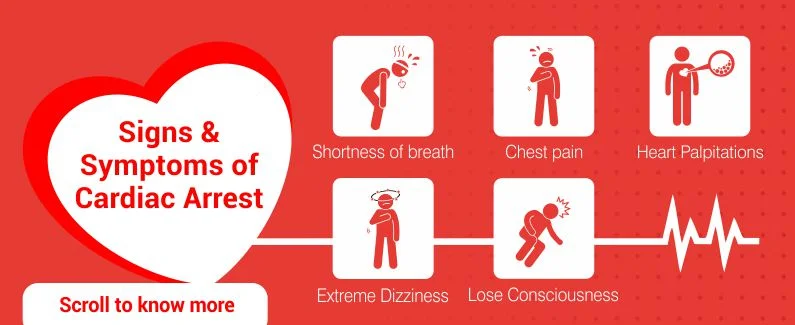Signs and Symptoms of Cardiac Arrest
Cardiac arrest is an extremely critical heart condition. In a cardiac arrest, the heart abruptly stops pumping blood, which restricts blood flow to the brain and other vital organs in the body causing them to lose consciousness. The heart has an electrical system and function of its own which controls the rhythm of the heartbeat. A sudden cardiac arrest may occur as a result of the electrical disturbances or irregular heartbeat (arrhythmia). Physical stress, severe lack of oxygen, intense physical exertion and very low blood pressure can cause electrical disturbances in the heart.
A cardiac arrest is also common in those with Coronary Heart Disease, a condition in which plaque builds up on the arteries, which supply oxygen-rich blood to the heart. The plaque buildup narrows the arteries reducing the blood flow. Those with a history of arrhythmia in the family are also at risk of cardiac arrest.
What are the signs and symptoms of a Cardiac Arrest?
A cardiac arrest can show certain signs and symptoms which can be considered as “Warning signs”. In case you or someone around you experience the following symptoms, be quick in calling in an emergency. If you are in cardiac arrest, you may:
- Have a feeling of extreme dizziness
- Have a shortness of breath
- Feel a pain in your chest
- Experience heart palpitations
- Slump or fall over
- Feel no pulse
- Have difficulty breathing or completely lose your breathing
- Lose consciousness
- Collapse
- Feel weak or fatigue
- Feel nauseous or have an urge to vomit
Who is at risk of having a cardiac arrest?
Cardiac arrest can have a wide range of causes. However, there are certain factors that put you at risk of a sudden cardiac arrest. Understanding these conditions and keeping a check on them can help you prevent this condition. Some factors that put you at risk of developing a cardiac arrest, include-
- Smoking
- Hypertension
- High blood cholesterol
- Diabetes
- Obesity
- Heavy consumption of alcohol
- No physical activity
- A family history of coronary artery disease
- A previous heart attack
- An episode of cardiac arrest in the family
- Consuming illegal drugs such as amphetamines and cocaine
- Having heart conditions such as birth defects, cardiomyopathy
- Not getting enough nutrition.
- Age- As one grows old, the chances of cardiac arrest increase
How can you prevent a cardiac arrest?
A cardiac arrest can occur as a result of a number of factors. The factors may vary from person to person. Knowing the signs and symptoms of a cardiac arrest can help you reduce the risk of a possible cardiac arrest. In order to prevent this condition, you must get regular check-ups and screenings for heart problems. In order to maintain a heart health, you must adapt and promote some healthy habits, including- Avoid smoking and excessive consumption of alcohol, eat heart healthy foods such as almonds, berries, fish high in omega-3s etc., indulge yourself in regular physical activity such as walking, jogging, regular heart check etc.
For those who have or have had other heart conditions in the past, must consult a doctor in order to take measures to improve your health. This may include eating a healthy diet, taking medicines on time and indulging in physical activity.
A sudden cardiac arrest is a medical emergency and if not treated immediately, it may cause sudden cardiac death. Quick and appropriate medical care, elevate chances of survival. Providing cardiopulmonary resuscitation (CPR), treating with a defibrillator, or even just compressions to the chest can help raise the chances of survival until a medical personnel arrives. Warning signs are present beforehand in majority of cases but often misunderstood or ignored. Knowing about cardiac arrest and heart problem symptoms and ways to prevent it can help you save lives.

